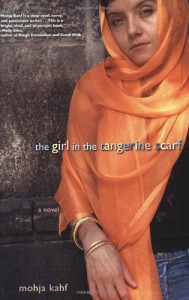 It's been a few weeks since I read this book, but I find that I still have mixed feelings about it.
It's been a few weeks since I read this book, but I find that I still have mixed feelings about it. First, I have to question who the book was intended for. This tale of a Syrian-American girl trying to find her place in both American and Muslim society was written in English, but did Kahf intend her readers to be primarily Muslims who might recognize themselves in her characters, or was she writing for a wider audience? I can't help thinking that perhaps the book was intended for other Muslim immigrants: the characters' consistent criticism of American society, and in particular their hypocrisy in complaining that Americans are ignorant about them while displaying equal ignorance about their American neighbors, is hardly endearing to this American reader. Although I appreciate that Kahf is being honest and that such opinions are common among immigrants generally, this is likely to be a limitation for readers who don't share Kahf's obvious prejudices.
As for the quality of the book, it's a mixed bag. I certainly learned from it. Kahf writes about the difficulties of growing up Muslim in America, but more than that she focuses on the diversity in opinions and lifestyles among Muslims; she seems intent on discrediting the idea that there is one monolithic "Muslim community." The protagonist's shifting personal relationship with Islam takes center stage for much of the book, providing an interesting story. The characters seem lifelike (although most have little depth or development), there are some vivid descriptions, and the writing style isn't bad (although I felt at times that Kahf was trying too hard: she would veer from literary allusions to heavily colloquial language so fast I got whiplash).
My biggest problem with the book is one several other reviewers have mentioned: too many characters. At the beginning, Kahf introduces seemingly every single member of the community in which her protagonist grows up, by name, whisks them away before we can get to know them, then brings them back later to speak a few lines, evidently expecting us to remember them. It felt a bit like spending a weekend at someone else's huge family reunion: the characters I met were believable, but I can't tell them apart or put names to faces. Later in the book, Kahf seems to want to introduce a character for every possible variation of Muslim ancestry and experience: conservatives and progressives, multi-generation American citizens and new immigrants and foreign students, those who've assimilated into American culture and those who haven't, people from the Middle East, from Central Asia, from the Persian Gulf, from Africa, a polygamist family thrown in for good measure.... and for a bit more diversity there's the heroine's Iranian roommate, Jewish friend, evangelical Christian friend, feminist friend, and on and on. There are simply far too many characters to get to know in a book of this length; they become mouthpieces for their various opinions and experiences rather than real people.
Despite its problems, I do think this book is interesting and that it has value--but more as a book you'll learn from than as one you'll enjoy for its plot or characters.





